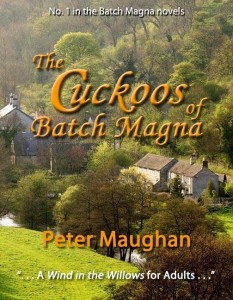Review: The Cuckoos of Batch Magna

One should know by now to abandon expectations when reading a book one knows littleabout, but one is oft times an idiot. My mistake when reading The Cuckoos of Batch Magna is that I had P.G. Wodehouse in mind and kept looking for similarities when I should have just enjoyed the gentle ride down a river author Peter Maughan intended.
You see I was recently reminded of Wodehouse’s If I Were You, where the Earl of Droitwich discovers he really isn’t the rightful heir, having been switched at birth with the true earl, who has grown up to be a socialist barber. The faux earl uses the opportunity to escape marriage to that sort of imperious woman Wodehouse so often imagines and it all works out all right in the end.
Peter Maughan’s book involves Sir Humphrey Strange—or Humph as he asks everyone to call him—a poor relation of the previous baronet, General Sir Humphrey Myles Pinkerton Strange, whose death leaves Humph in possession of Batch Hall, the crumbling ancestral home of the Stranges. But Humph is burdened with death duties, the cost of fixing up the hall and the question of what to do with the tenant farmers and the renters of the no longer functional paddle steamboats on the river that runs through Batch Magna.
It doesn’t help that Humph is an unsuccessful American businessman whose only qualification to be a baronet is the circumstance of his being related to the late general, and that Humph feels he has to live up to the reputation of his successful but long dead father. In addition to that baggage, Humph has been persuaded to believe he must evict the paddle boat tenants and turn Batch Hall into a quaint hotel.
The strange collection of paddle boat residents include the retired naval commander who’s searching for Atlantis; earth mother Jasmine and her large family; the Owens, including river-savvy father Owen, his wife Annie who took care of the general, and their nubile daughter Ffion; and crime novel writer Phineas Cook. They live on four paddle boats, remnants of the Cluny Steamboat Company, which the general’s father brought to the town that straddles the Welsh-English border.
Of course the steamboat residents like their idyllic life on the river. They’ve formed a community of oddballs and are so reluctant to move they even contemplate finding an ingenious way for Humph to meet an untimely death. Meanwhile Humph, free of the distractions of his life in America, falls in love with the people, the land and the river. He also drifts from his dedication to his fiancée, an imperious sort of woman who only wants to marry Humph so she can be called Lady Sylvia. H’m, maybe there is some similarity to Wodehouse here.
The writing style is completely different, of course. Wodehouse plots are meticulous and seemingly fast paced (a weekend at a country house), although an objective observer might say not much really happens. Maughan’s style is leisurely and an objective observer might say not much really happens. If you’ve ever taken an English river cruise or traveled in a narrowboat, you’ll recognize Maughan’s style. The journey is its own reward and you won’t enjoy it if you try to speed it up.
I’m afraid that’s what I was guilty of, at first. I read a little too fast and didn’t take the time to let my fingers hang off the side of the boat and trail through the water. The plot is also like a water journey; it might twist and turn a little but you will predictably arrive at your destination. There is no great surprise here; you just wonder whether Maughan will resolve the conflict through a deus ex machina or whether he had earlier sown the elements of that resolution previously.
No, the pleasure of this book is the charmingly askew characters and the real sense that Maughan’s fictional community really should exist somehow. The author has crafted a nice group of eccentrics with a good balance of agendas: the boat residents initially despise Humph; the shop owners welcome Humph’s initial plan of evicting the river dwellers and turning the Hall into a tourist destination; the general’s granddaughter (unable to inherit because the land is entailed a la Jane Austen and Downton Abbey) treats Humph civilly but coldly; and those who don’t know who Humph is treat him warmly. The easy acceptance of Humph is ultimately the deciding factor that makes sure it all works out in the end.
It also helps that the setting is a little out of time and place. You begin to realize there are no mentions of smart phones or computers and I think it helps tie the book to a lot of British TV and film from the 1970s and ’80s. You can’t help but think of Local Hero and To the Manor Born. In fact many readers have suggested The Cuckoos of Batch Magna would make a great TV series, something I’m sure author Maughan, an ex-actor and script writer, has already considered. Fortunately, Maughan has written a sequel, Sir Humphrey of Batch Magna, that would drive a season (or series) two.
So if you haven’t already guessed, I’m heartily recommending this book to anyone who has the patience to enjoy it. Forget about my mistaken comparison to Wodehouse. It’s only resemblance is that it’s English (when it isn’t Welsh), there are finely drawn characters and objectively not a lot happens. But where’s the fun in being objective?
